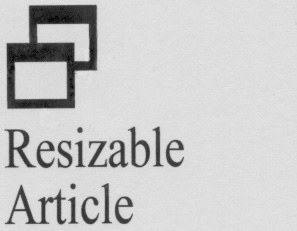![]()

Stopping Communication
Written June 6, 2003

Although I have a master's degree in radio and television, I never took any "communication" courses in college.
The closest that my classes came to any theory of this subject was a 48-page text called Communications: The Transfer of Meaning. It describes how we transmit ideas from one person to another, along with some of the problems that can distort the transmission. "If we have difficulty understanding — or being understood — it is likely we have ignored some part of the communications process."
I'd like to propose another way of looking at the process, a way that may seem counterproductive at first glance. Most likely, this theory already exists in some form, and I'm simply ignorant of it.
Rather than considering how best to communicate ideas, let's look at how communication can be prevented.
Suppose that I've been inspired by a comic strip to write a poem. My masterpiece goes like this:
In the land of Id,
Peasants think
That the King of Id
Is a fink.
I want to share this poem with others. I can communicate it using either point-to-point or point-to-multipoint channels.
An example of point-to-point is a telephone call. From my home (the first point), I telephone your home (the second point) and read you the poem. Or I might send the poem to you in written form, in a letter or an e-mail. If I have hundreds of friends, I can repeat this process hundreds of times.
An example of point-to-multipoint is a radio or TV broadcast. From a station (the first point), I broadcast my poem so that it potentially can be received anywhere in the state (the multiple points). Or I could get the poem printed in a newspaper, or I could post it on this website or elsewhere on the Internet. Once it's published in some way, theoretically it's available to anyone.
But various entities have reasons to block this communication.
• Let's first consider the point-to-point case, in which I'm sending my poem to you.
Maybe you've heard my poems before. You don't want to accept any more phone calls from me, so you use caller ID or put me on a do-not-call list. Or perhaps you're too busy to receive telephone communications from anyone, so you let your answering machine do the screening.
If I send you the poem via mail or e-mail, you can throw it away, even without opening it. You might have special procedures for blocking junk mail or spam.
In some cases, communication between the two of us can also be inhibited by a third party. Perhaps I've been annoying you with poetry so often that a court order now enjoins me from contacting you. Or perhaps my e-mail provider refuses to transmit my poem because it includes the word "fink."
• When we consider the point-to-multipoint case, in which I publish or broadcast my poem to the whole world, we find even more reasons for blocking communication.
First, I may want to block it myself. Most likely, this is for commercial reasons. I own the rights to this poem and I want it to reach many people, but only if they pay me 17¢ first. So I scramble the poem. Only paid-up subscribers can decode it.
Second, even if the poem is being sent out free to everyone, each potential receiver has the right to block it for whatever reason. They don't like poetry, they don't like me, they have better things to do, and so on.
Third, there are many intermediaries that may want to prevent the poem from getting through. Perhaps:
The government of Canada objects on the grounds that this work exceeds foreign content limits because it was written by an American, so it shouldn't reach Canadian citizens.
The Peasants' Protective Party initiates libel and slander action in 39 countries.
The Kingdom of Id would like to suppress the poem worldwide, claiming that it advocates the overthrow of Id's government. But the Kingdom lacks authority outside its borders, so it merely jams my broadcasts and issues an internal ban: no Idiot may possess any of my writings.
The Decency Committee objects to that word "fink" and recommends that its members not read the poem. Similarly, the fundamentalist branch of the Iddish Church puts the poem on its Index of Writings that Don't Exist.
Also, little Johnny's parents feel that he's too young to be exposed to references to leaders that are finkish or otherwise less than perfect. Such references might impair his respect for authority. Therefore, they tell Johnny he can't read my poem.
In these various examples, we may agree or disagree with the censors' motives. Many Americans feel that a parent should be able to restrict a child's access to literature, and a church should be able to control what its members read, but a government should not be able to control what its citizens read. People of other lands might have other opinions.
Regardless, there are many parties with an interest in blocking some or all of the paths of multipoint communication. These parties include not only the sender and the receiver but also outside authorities.
Any theory of communication ought to account for these various modes of censorship.
